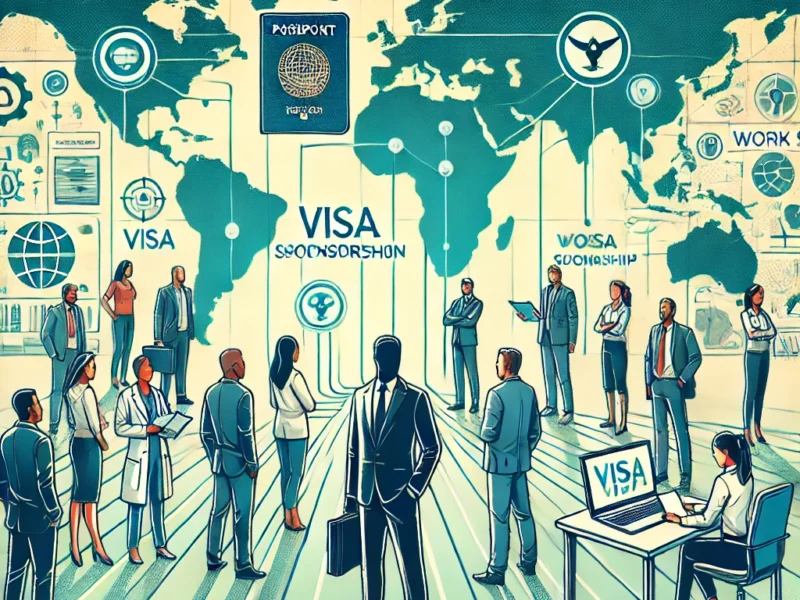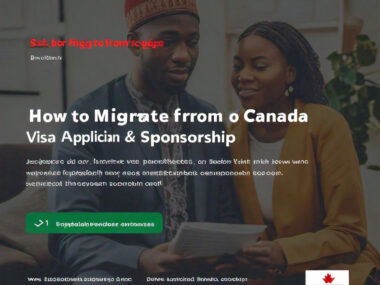The world is increasingly interconnected, with businesses and economies relying on a global workforce to fill essential roles. Skilled workers, in particular, are in high demand across various sectors such as technology, healthcare, engineering, and finance. For many professionals, working abroad represents a significant career opportunity, and visa sponsorship is often the key to unlocking this potential.
Visa sponsorship for skilled workers allows foreign professionals to work in a country where they may not otherwise be eligible to work legally. Employers sponsor visas to bring in talent from around the world, often when there is a shortage of qualified domestic workers for certain roles. This process benefits both employers, who gain access to a wider talent pool, and skilled workers, who can advance their careers in global markets.
In this article, we will delve deep into the concept of visa sponsorship for skilled workers, covering the types of visas available, the process of securing sponsorship, the industries with high demand for skilled workers, and tips for finding jobs that offer visa sponsorship.
What is Visa Sponsorship?
Visa sponsorship is a formal process through which an employer in one country supports a foreign worker’s visa application to work legally in that country. The employer commits to being responsible for the worker during their time in the country, ensuring that they comply with immigration regulations and fulfill the role for which they were hired.
Visa sponsorship is essential because most countries require foreign workers to have a work visa before starting employment. In many cases, these visas can only be obtained with the support of an employer who is willing to navigate the bureaucratic and legal processes involved in hiring an international employee.
Types of Work Visas for Skilled Workers
There are several types of work visas that skilled workers can apply for, depending on the country, the type of work, and the qualifications required. Below are some of the most common types of visas available for skilled workers.
1. H-1B Visa (USA)
The H-1B visa is one of the most popular work visas in the United States for skilled workers. It is designed for positions that require specialized knowledge, typically in fields like information technology, engineering, healthcare, finance, and academia. The H-1B visa is initially valid for three years, with the option for a three-year extension. Employers must sponsor the visa, proving that the foreign worker has the necessary qualifications and that there are no qualified American workers available for the job.
The H-1B visa is subject to an annual cap, with a limited number of visas issued each year, making the process highly competitive. Companies that frequently hire international talent, especially in tech, often participate in the H-1B lottery.
2. Tier 2 (General) Visa (UK)
The Tier 2 (General) visa is the UK’s primary route for skilled workers to come and work in the country. This visa allows employers to sponsor foreign workers in roles that cannot be filled by residents of the UK or the European Economic Area (EEA). Skilled roles in industries such as healthcare, engineering, and IT are commonly filled by Tier 2 visa holders.
To apply for a Tier 2 visa, the worker must have a job offer from a UK-based employer that holds a sponsor license. The employer is responsible for obtaining a Certificate of Sponsorship (CoS) for the employee, after which the visa application process begins.
3. Temporary Skill Shortage (TSS) Visa (Australia)
Australia’s Temporary Skill Shortage (TSS) visa allows businesses to address labor shortages by bringing in skilled workers from overseas. There are three streams under the TSS visa program: the short-term stream, medium-term stream, and labor agreement stream. Each stream caters to different industries and skill levels, with visa durations ranging from two to four years.
The TSS visa requires employer sponsorship, and the employer must prove that there is a genuine shortage of workers in the specific occupation being filled. Once sponsored, workers can live and work in Australia for the duration of their visa, with the possibility of extending their stay or transitioning to permanent residency.
4. Global Talent Stream (Canada)
Canada has become one of the top destinations for skilled workers thanks to its welcoming immigration policies. The Global Talent Stream (GTS) is part of Canada’s Temporary Foreign Worker Program, allowing companies to hire highly skilled international workers quickly. The program targets technology and engineering roles, and qualified workers can receive a work permit in as little as two weeks.
Employers in Canada must apply to sponsor a worker through the GTS by demonstrating a need for specialized talent that cannot be sourced locally. After obtaining approval, the worker can apply for a work visa and move to Canada to begin employment.
5. Blue Card (European Union)
The EU Blue Card is a work visa for highly skilled workers from outside the European Union. It allows non-EU nationals to live and work in an EU member state (except Denmark and Ireland, which do not participate). To qualify for the Blue Card, workers must have a university degree or comparable work experience, a job offer from an EU employer, and a salary above a certain threshold.
The EU Blue Card is a pathway to permanent residency in the EU, offering professionals long-term opportunities to build their careers in Europe.
Industries in High Demand for Skilled Workers
While the need for skilled workers varies by country and economic conditions, certain industries consistently offer visa sponsorship due to a shortage of qualified talent. Below are some of the key industries where skilled workers are most likely to find opportunities for visa sponsorship.
1. Information Technology (IT)
The IT industry is one of the largest employers of skilled workers globally. With rapid technological advancements and increasing demand for software developers, data scientists, cybersecurity experts, and AI specialists, companies are frequently unable to find enough qualified professionals locally. As a result, many tech firms actively sponsor work visas to bring in skilled foreign workers.
Countries like the United States, Canada, the United Kingdom, and Australia have thriving tech sectors that offer numerous visa sponsorship opportunities.
2. Healthcare
The healthcare industry faces a persistent shortage of workers in many countries, particularly in roles such as doctors, nurses, and medical technologists. As populations age and healthcare needs grow, the demand for skilled healthcare professionals continues to rise.
Many countries, including the U.S., UK, and Canada, have specific visa programs aimed at addressing these shortages by attracting skilled healthcare workers from abroad.
3. Engineering
Engineering is another field with a significant demand for foreign talent. Civil, mechanical, electrical, and software engineers are in high demand, especially in industries like construction, manufacturing, and aerospace. Skilled engineers often have the opportunity to work on large-scale infrastructure projects or cutting-edge technological innovations.
Many countries offer visa sponsorship for engineers, particularly when there is a shortage of qualified local candidates.
4. Finance and Accounting
Global financial markets require highly skilled professionals to manage investments, analyze data, and ensure compliance with regulations. Finance and accounting roles, such as financial analysts, auditors, and consultants, are in demand, especially in financial hubs like New York, London, and Singapore.
Financial firms often sponsor visas for skilled workers, particularly in specialized areas like risk management, investment banking, and forensic accounting.
5. Education and Research
Universities and research institutions frequently hire international academics and researchers to contribute to scientific advancements and education. Professors, researchers, and postdoctoral scholars are often eligible for visa sponsorship, especially in fields like science, technology, engineering, and mathematics (STEM).
Countries like the U.S., UK, and Germany have robust research sectors that actively recruit talent from around the world, offering visa sponsorship to qualified candidates.
How to Secure a Job with Visa Sponsorship
Finding a job that offers visa sponsorship requires careful planning and persistence. Below are some strategies to help skilled workers secure employment with sponsorship.
1. Research Companies that Sponsor Visas
The first step in securing visa sponsorship is to identify companies that have a history of sponsoring foreign workers. Many multinational corporations and large firms regularly hire international talent and have established processes for sponsoring visas. Websites like MyVisaJobs, LinkedIn, and Glassdoor can help you find companies that sponsor visas in your industry.
2. Tailor Your Job Applications
When applying for jobs that require visa sponsorship, it’s essential to tailor your resume and cover letter to highlight your specialized skills and qualifications. Emphasize any experience you have that sets you apart from local candidates, and clearly articulate why your expertise is essential to the company.
3. Network with Industry Professionals
Networking is a powerful tool for finding visa sponsorship opportunities. Attend industry events, join professional organizations, and connect with professionals on LinkedIn to build relationships with people who can help you find job opportunities. In many cases, referrals from current employees can increase your chances of securing a job with visa sponsorship.
4. Consult with Immigration Experts
Navigating the visa sponsorship process can be complicated, and it’s often helpful to work with an immigration attorney or consultant who specializes in work visas. They can guide you through the application process, ensure that all necessary documentation is in order, and help you avoid common pitfalls that could delay your visa approval.
5. Be Open to Temporary or Contract Work
Sometimes, it’s easier to find visa sponsorship through temporary or contract work rather than full-time employment. Employers may be more willing to sponsor a visa for short-term projects or temporary roles, and once you’ve proven your value, they may extend the sponsorship for a full-time position.
Challenges of Visa Sponsorship for Skilled Workers
While visa sponsorship offers skilled workers a pathway to work abroad, there are several challenges associated with the process.
1. Limited Visa Availability
In many countries, work visas are subject to quotas or caps, meaning that only a limited number of visas are available each year. For example, the U.S. H-1B visa is subject to an annual cap,
and the number of applicants far exceeds the available visas, leading to a lottery system. This makes the process highly competitive and uncertain.
2. Employer Reluctance
Not all employers are willing to sponsor visas due to the costs, legal complexities, and time involved in the process. Smaller companies, in particular, may lack the resources to sponsor foreign workers, which can limit the number of job opportunities available.
3. Lengthy Application Process
The visa application process can be lengthy and complex, often taking several months from the time a job offer is made to the time the visa is approved. This can be frustrating for both the employer and the employee, especially if there are delays in the process.
4. Changing Immigration Policies
Immigration policies can change depending on the political climate of a country, which can create uncertainty for both employers and foreign workers. It’s important to stay informed about current immigration laws and policies in the country where you want to work.
Conclusion
Visa sponsorship for skilled workers is a critical pathway for professionals seeking to expand their careers in global markets. While the process can be challenging, the opportunities available to skilled workers in industries such as technology, healthcare, engineering, and finance make the effort worthwhile.
By researching companies that sponsor visas, tailoring your job applications, building a strong professional network, and consulting with immigration experts, you can increase your chances of securing a job with visa sponsorship. As the global demand for skilled talent continues to grow, visa sponsorship remains a valuable tool for connecting skilled workers with opportunities worldwide.


